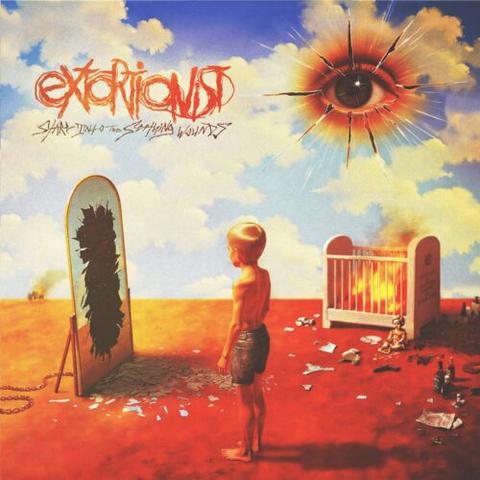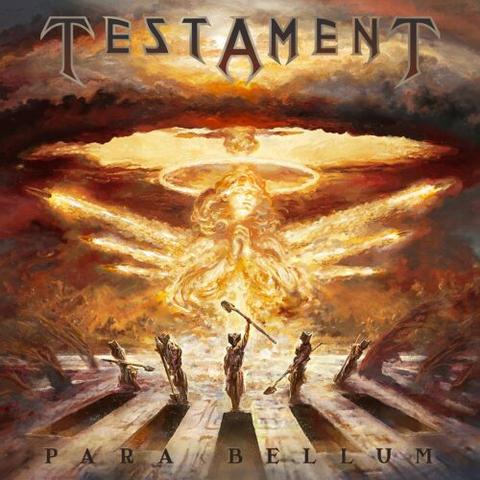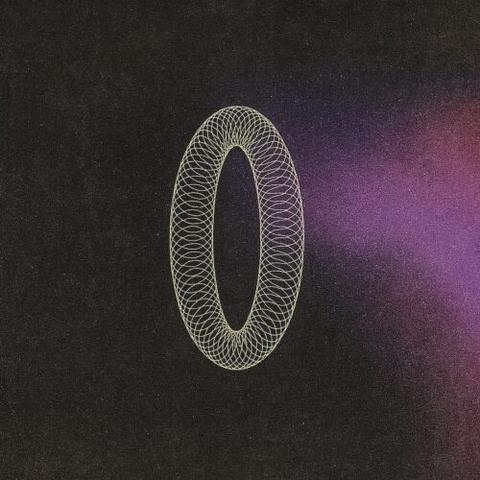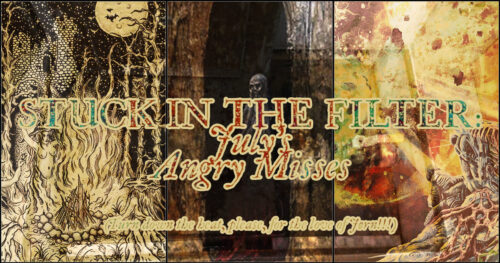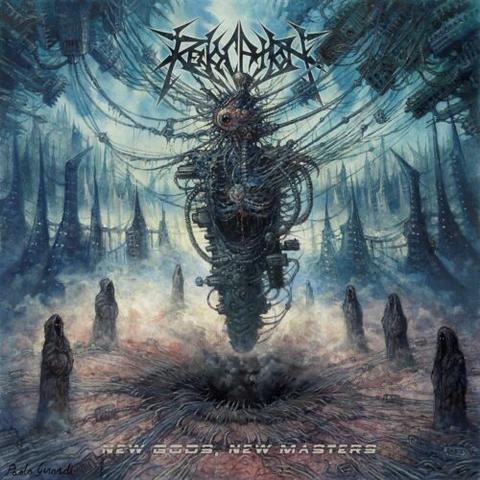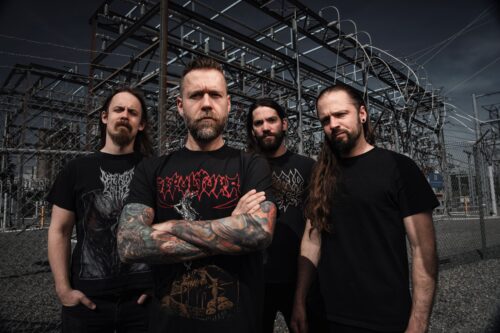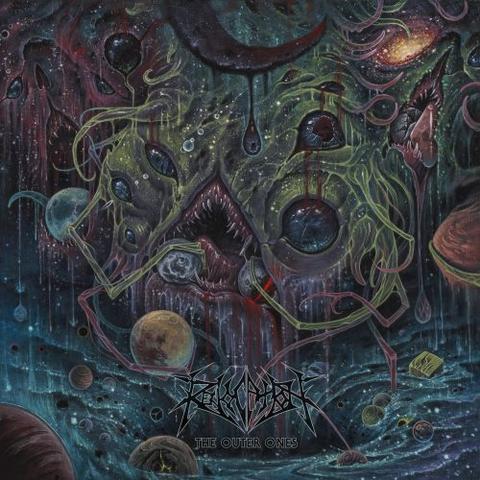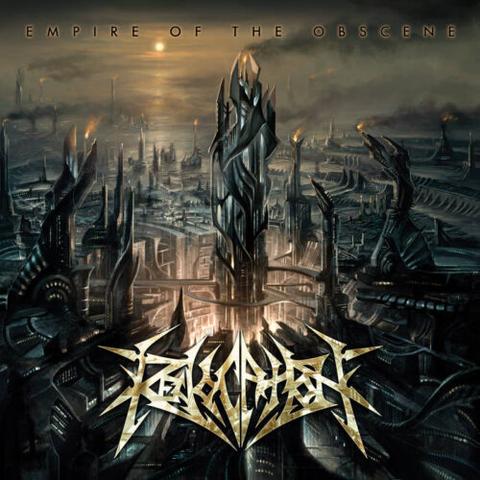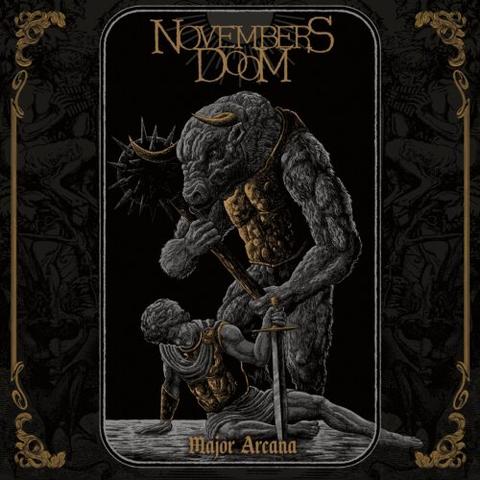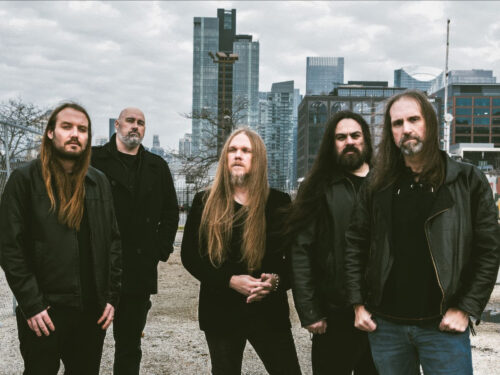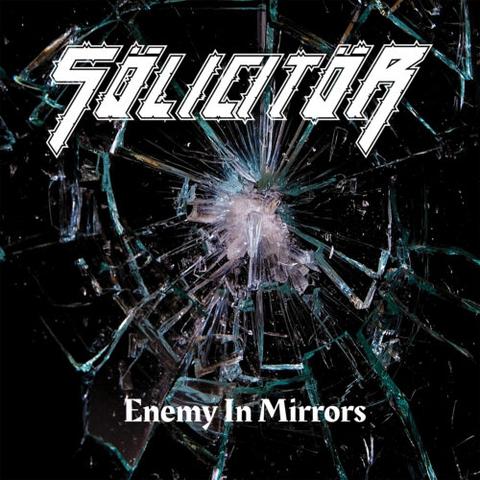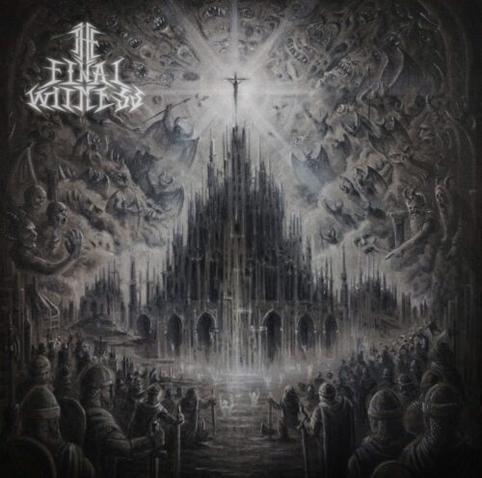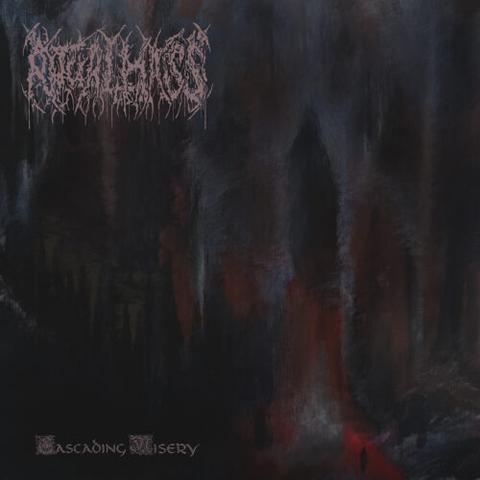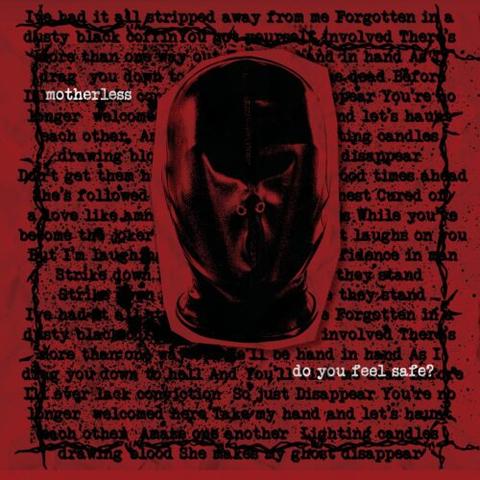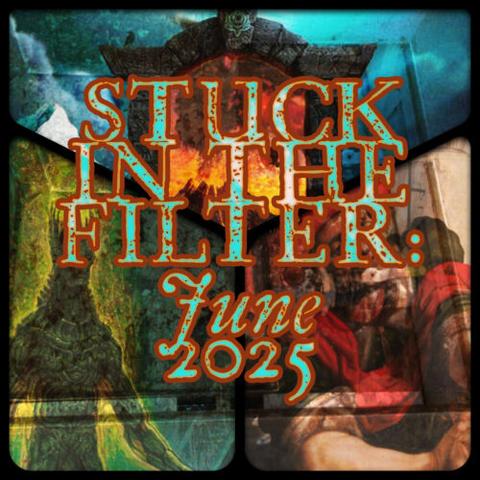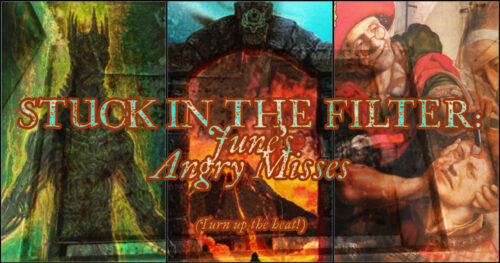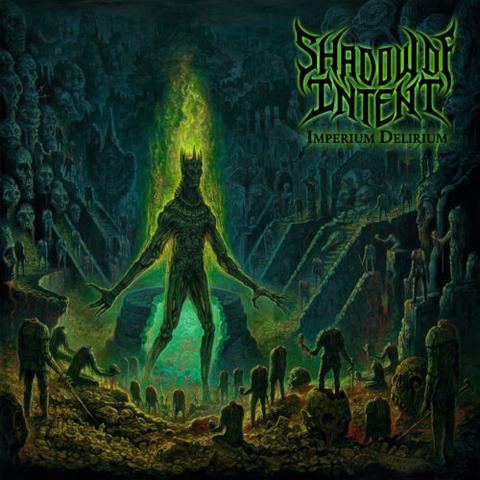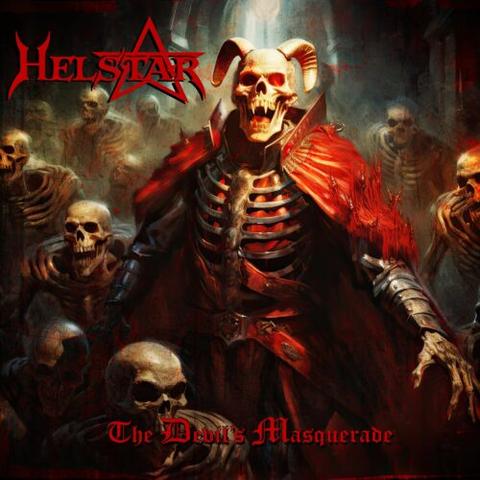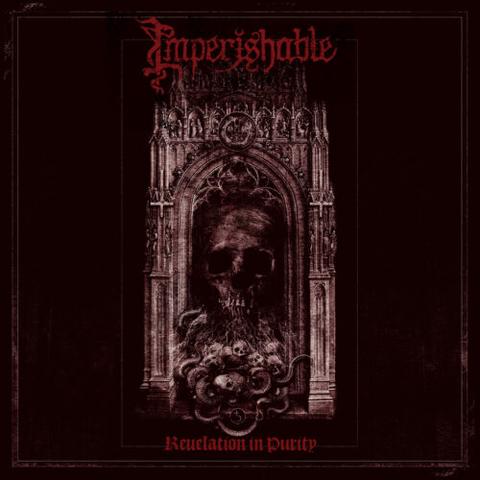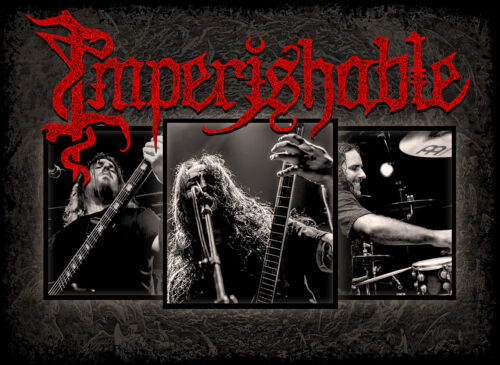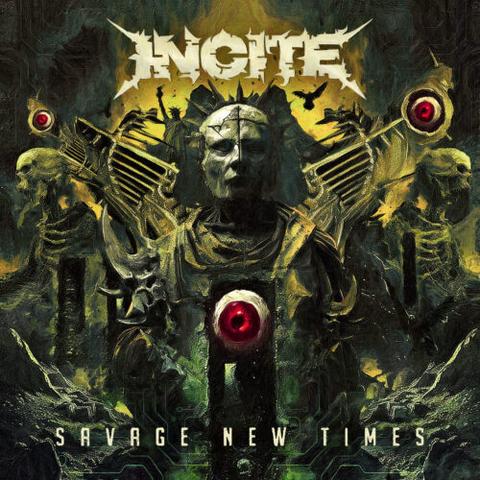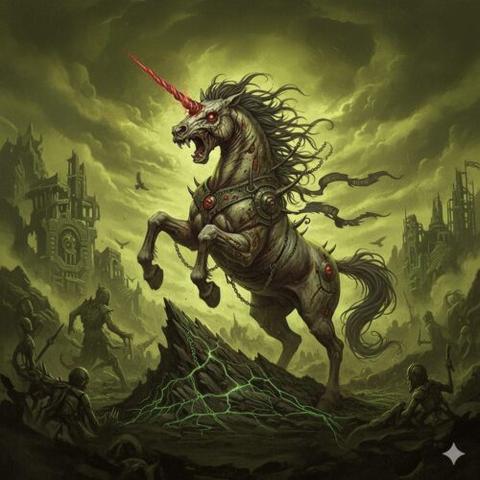AMG Goes Ranking – Revocation
By Saunders
Revocation makes me feeling fucking old. It’s difficult to believe fifteen odd years have passed since stumbling across their phenomenal sophomore effort, Existence is Futile. It became instantly clear Revocation were one of the fresher, most exciting bands emerging in the modern metal scene of the era. Their career seemed to propel in fast forward as they pumped out top notch album after album, maintaining an impressive work rate and exceptional consistency, while refusing to repeat themselves. Couple of minor bumps along the way notwithstanding, Revocation’s vibrant, signature combination of technical death-thrash, infectious songwriting and acrobatic guitar hero shreddage from mastermind Dave Davidson has long cemented Revocation as a titanic force in the crowded realms of the modern metalverse.
Formed in 2006, the Bostonites unleashed their brash and confident debut Empire of the Obscene in 2008. From humble but exciting beginnings the Revo boys have proceeded to go on an absolute fucking tear across multiple albums, the most recent being the darker pathways and heavier pastures of 2022’s Netherheaven, arguably a return to form. Though in fairness Revocation have never dropped a dud, and despite a couple of minor career lulls, they have remained a dependably consistent force to be reckoned with.
September 26th, 2025 ushers in Revocation’s ninth LP, New Gods, New Masters. As anticipation grows for the star packed opus, what better time for our resident Revocation fanboys; including the return of the illustrious Kronos, who so eloquently championed the band on these very pages across multiple releases with his insightful wordsmithery and critical analysis, to unload our collective opinions on the band’s formidable discography. Nearly twenty years since their formation and boasting a catalog of rare consistency and power, we have our work cut out for us. Strap yourselves in…
Disclaimer: After careful consideration we have actioned the Human Waste/Despise the Sun Ranking Law of including Revocation’s highly regarded Teratogenesis EP from 2012 due to the consensus this is a meaty and essential mini-platter in the power packed Revocation repertoire.
The Rankings
Saunders
#9. The Outer Ones (2018) – While difficult to pinpoint, The Outer Ones remains an elusive Revocation album, and one I reach for least frequently, despite being one their more recent offerings. Although The Outer Ones doesn’t deviate savagely from the vice-tight yet elastic formula Revocation long since mastered, it leans deeper into murkier blackened death forays and features a cold, clinical and dissonant edge. Its darkly menacing sheen and blasty, death forward approach is responsible for some rousing moments and it’s easy to admire the album’s frantic, calculated intensity. Tunes like the rip-roaring opener “Of Unworldly Origin,” chunky brawler “The Outer Ones” and the thrashy, proggy blackened death of “Luciferous” highlight an album that has grown on me but ultimately falls short of the band’s other works.
#8. Empire of the Obscene (2008) – A bold and potential-packed debut, Empire of the Obscene rises well beyond a mere curiosity or roughshod early edition of Revocation’s rapidly evolving sound. I came to the debut after being first enamored by Existence is Futile and Chaos of Forms, both superior examples of the band’s exceptional early career highs. Still, Empire of the Obscene is a killer debut and refreshing, slashing technical thrash opus, with a healthy smattering of death. The vibrant, raging “Tail from the Crypt” is an early career highpoint, while other choice cuts include the bizarro “Suffer These Wounds,” and rippling axerobatics of “Exhumed Identity.” It’s solid stuff, yet inconsistencies creep in and some of the writing feels a tad overcooked, falling short of the ripping high standards and impeccable writing featured across the Revocation career arc
#7. Great is Our Sin (2016) – Perhaps the first time upon release a Revocation release failed to gain immediate traction. Again the sheer strength and power of its predecessors found Great is Our Sin fall a fraction short of the impeccable standards maintained during the first half dozen or so years of the band’s recording career. And it feels like an outlier merging the band’s different eras, pre and post-Revocation. Playful tech thrash energy, proggy dabbling, and darker, deathly pummels are in abundance, as per expectations. I appreciate the more thrash-centric turns, less prominent in their later era. Great is Our Sin features many of the strong attributes listeners have come to expect, sounding like a melodically mature yet overly familiar and safe album. The songwriting is consistently solid, featuring the odd flirtation with greatness. Old school flavored thrasher “Arbiters of the Apocalypse,” the prog-infused death-thrash of “Communion,” sinister, punishing thrust of “Only the Spineless Survive,” and epic, experimental rumble of “Cleaving Giants of Ice” are nuggety examples of the album’s finer moments.
#6. Netherheaven (2022) – Netherheaven marked a refreshing return to form after the solid if underwhelming, The Outer Ones. Kronos hit the nail on the head when he proclaimed Netherheaven to be the natural successor to Deathless, as similarities in tone, mood and execution are evident. Revocation flexed their deathly muscles and advanced musicianship in service of complex, yet undoubtedly catchy compositions, such as the brutally groovy throes of “Nihilistic Violence,” labyrinthine trip of “Strange and Eternal” and blast-addled, vocal trade-off on scorching closer “Re-Crucified.” Despite being enveloped with shadowy, sinister atmospheres, Netherheaven is imbued with a fun, adventurous spirit, also resulting in one of Revocation’s heaviest offerings. Davidson’s ever inspiring axework never ceases to amaze and songwriting finds a real sweet spot between grooving, chunky chugs, technical mastery, and throwbacks to their thrashy roots. Meanwhile, his increasingly versatile and confident vocals remain a somewhat underrated aspect of the Revocation experience. Not a career high point, but a great album nonetheless.
#5. Deathless (2014) – Revocation’s distinctive formula has long separated them from the hordes of tech death and thrash bands in the scene. One of Revocation’s greatest attributes is their ability to manipulate their craft and pivot in versatile directions. Deathless emerged as a darker, sinister trip down a fittingly deathlier path, creating a welcome stylistic deviation to evolve and keep any semblance of stagnation at bay. Though follow-up Great is Our Sin slightly deviated, Deathless marked the beginning of Revocation embracing the darker corners of their psyche, charting murkier, heavier and altogether more brutal, unforgiving terrain. Thankfully, Deathless didn’t abandon their knack for penning challenging, infectious, thrash-powered tech-death jams. Nor does Deathless forget how to have fun, as evidenced by the shout-along chorus and straightforward headbangable riffs adorning the title track. However, Deathless’ most impactful, jolting moments are delivered elsewhere. Classic opener “A Debt Owed to the Grave” and the cutthroat “Scorched Earth Policy” unleash vicious yet eloquently delivered evidence Revocation still thrash with the best of them. While the immense “Madness Opus” channels Revocation’s progressive inclinations within a barbed, death metal shell. Top-tier stuff.
#4: Revocation (2013) – The dark horse and underrated gem in the Revocation kit bag, their self-titled effort sparkled between the stunning Teratogenesis EP and the brooding tones and violent stomp of Deathless. Though not regularly mentioned amongst the band’s finer works, Revocation demands regular attention amidst an increasingly stacked catalog. Following up Chaos of Forms was always going to be a tough ask, however, Revocation proved up to the challenge. Revocation is a playful, quirky, fun-filled blast from go to whoa, keeping Revocation’s ever-evolving formula fresh and inspired. The versatile songwriting makes for a consistently gripping listen and one of their more diverse offerings. Whether belting out aggressive, full-throttle tech-thrash workouts (“The Hive,” “Numbing Agents”), warped tech death beatdowns (“Fracked,” “Scattering the Flock”), banjo-infected riff monsters (“Invidious”) or mosh-ready juggernauts (“Archfiend”), Revocation has all bases covered. A slightly more stock backend the only thing diminishing an otherwise top-notch album.
#3. Teratogenesis (2012) – Only the most curmudgeony, glass-half-empty pessimist discounts the short and sweet value of the often underrated EP format. Continuing a creatively booming and prolific hot streak, Teratogenesis is a wild, breakneck ride featuring the Revocation lads operating at the peak of their powers. New and old listeners alike would be foolish to neglect this action-packed beauty. If there is something slightly lacking in Revocation’s later career, it misses the outrageously fun and turbo-charged thrashiness and technically dazzling though infectious spirit so prevalent on Teratogenesis and surrounding releases. Revocation’s eye-popping instrumental prowess and whipsmart songwriting serve genuinely well-crafted, catchy songcraft and a bevy of sharp turning dynamic twists and killer riffs. “The Grip Tightens” bottles everything great about the Revocation sound into a career stunner. Elsewhere, “Manically Unleashed” unleashes cracking bursts of tech thrash precision amidst intricate melodic breaks and soul-searching solos, while “Bound By Desire” closes proceedings with a blast and thrash-riddled bang, replete with gorgeous melodic soloing and proggy touches.
#2. Chaos of Forms (2011) – Weirdly enough, I recall being fleetingly underwhelmed when Chaos of Forms dropped. Expectations were sky high, and Chaos of Forms represented a different beast to its immediate predecessor. Featuring an aggressive though more lighthearted, freewheeling tone and experimental streak, Chaos has long since become a personal favorite and modern metal classic. It is also rather simply the most fun Revocation album. Davidson is in his element, firing off some of the finest solos of his career to decorate fast-paced, quirky tech death-thrash compositions, aided by an unstoppable line-up, including the first to feature guitarist/vocalist Dan Gargiulo (Artificial Brain), adding an exciting extra dimension to the band’s sound. Unleashing a trio of instant Revocation classics right off the bat courtesy of “Cretin,” “Grave Robber” and “Harlot”, any notion Chaos of Forms being front-loaded is swiftly demolished as the album unfurls with banger after banger. From the melodic, singalong chorus of “No Funeral,” through to the brainy, twisting riffage of the title track, zippy, thrash-laden charge of “Beloved Horrifier,” and densely packed, stuttering tech death of “Reprogrammed,” Chaos is a versatile, sparkling jewel in the Revocation canon.
#1. Existence is Futile (2009) – Beyond the endearing factor, this was my first Revocation album and the warm fuzzy nostalgia associated; Revocation’s astonishing sophomore belter Existence is Futile emerged as a bottled lightning moment. Revocation’s impressively acrobatic musicianship and technical prowess was accelerated to new heights. However, the bulletproof songwriting and smart, yet dazzlingly intriguing arrangements were grounded by tight and aggressive songs that pulled no punches. An astonishing leap forward from an already exciting and accomplished debut, Existence is Futile has a raw energy and speedy, exhilarating urgency backed by polished, intricate songwriting, parasitic hooks and the warped, unmatched musicianship and advanced shreddery we have now long come to expect from Davidson and crew. Songs are largely stripped back in length from the debut, pared down to the bare essentials, maximizing impact. Davidson’s underrated vocals sound as vital as ever. A thoroughly gripping listen front to back, with the likes of “Pestilence Reigns,” “Deathonomics,” “The Brain Scramblers,” “Reanimaniac,” “Dismantle the Dictator” and ambitious closer “The Tragedy of Modern Ages” a handful of essential cuts.
Kronos
“Please help!” prayed my erstwhile colleagues, “our taste is underdeveloped to a near-blastular degree, and we are oh so disdraught! We seek but a simple ordination of technical death-thrash records but lack the True Knowledge of quality!”
Now moved, I descend from on high, gracing them not just with my presence but with my very acknowledgement of their pitiful existence: in one hand my catechism, in the other my nose. For those enlightened beyond the reflexive need to communicate the truths of quality, the ordering of Revocation records is a simple thing. One needs only to recognize the generational talent and drive of a one Dave Davidson, the extraordinary caliber of musicians that he has surrounded himself with, and analyze the triumphs and, shall we say, try-umphs, of their many recordings with an objective eye informed by a coherent understanding of the material and aesthetic universe in which they occur.
# 9 The Outer Ones (2018) – Revocation built a career based on an inseparable trinity of inventive riffs, creative songwriting, and infectious fun. In 2018 they denied this trinity and were cast into oblivion for four years thereafter; sentenced to relentless touring in which they played The Outer Ones lethargic and self-serious tech death alongside probably fifty other bands peddling similar stuff but more committed to it. That The Outer Ones seems to be their most popular release is a testament to the essential wickedness of our heathen age, that so many will follow a false prophecy.
#8 Great Is Our Sin (2016) – Indeed, but Revocation’s Slayer-worship record might have been better named Great Will Be Our Sin, given that its follow-up was The Outer Ones. But the title gets the point across; this was at the time their nastiest, deathiest album. Muscular and mean, Great Is Our Sin attempted brute-force repentance with burly but brainy tracks like “Monolithic Ignorance” serving up festering fun and “Only the Spineless Survive” providing the band’s most brutal beating until Netherheaven. Cruel as a crucifixion, Great is Our Sin is a treat, but not a joy, to experience, with too much of its runtime given to grinding grooves that don’t showcase the band’s strengths.
#7 Empire of the Obscene (2008) – In a way, it’s stunning to see how far Revocation have come since their debut: not far at all. In this we are confronted by the theopneustic nature of their art; seventeen years on, we can expect New Gods, New Masters to sound basically like Empire of the Obscene. This is death thrash that, while more fun than a barrel of monkeys and twice as rowdy, is impossible to find corny because it’s just too perfectly executed. For a young band, Revocation have a self-assuredness that evades many veteran groups, even as the death-thrash trinity’s endless invention pushes fast-moving songs up to and past the five-minute mark. From the dry but clear production, grinning art-school riffing to the waggling, showboat jazz soloing, every surface of the Revocation mold is here for the band to crack and ooze out of and pull away from on future recordings.
#6 Netherheaven (2022) – Netherheaven saw Revocation a three-piece for the first time since Chaos of Forms, and on firm footing as ever to make their first devoted death metal record. Netherheaven’s highlights (“Galleries of Morbid Artistry” and “Re-Crucified”) unfold like intricate torture machines from a macabre storybook, but mean, mid-paced grooves stick together and weigh down far too much of the record’s runtime. Netherheaven recovered much of the charm that The Outer Ones jettisoned but doubts as to the band’s future form remain.
#5 Existence is Futile (2009) – Empire of the Obscene really didn’t need to be improved upon, but Revocation are moved not by need but possibility. Existence is Futile’s leaner, focused writing got the band out of their own way. While some sections can come across a bit sparse, the difference in memorability between Empire and Existence is marked, with tracks like Deathonomics and Dismantle the Dictator becoming staple songs. Gruesome tech-thrash tracks like “Pestillence Reigns” and “The Brain Scramblers” were a revelation, and bruisers like “Dismantle the Dictator” and “Anthem of the Betrayed” gained the group countless new adherents.
#4 Revocation (2013) – One of the lesser-appreciated joys of the Revocation discography are the band’s actual texts, and nowhere are they more compelling than on their self-titled record. Whether railing against the rich, oil companies, or the American media environment, Revocation pairs incisive sing-alongs with inspiring musicianship; Davidson even pulls out a Banjo to parody cable news (“Invidious”). Revocation capped the first era of the Revocation discography in impeccable form with their most front-to-back memorable LP.
#3 Deathless (2014) – Deathless was a turning point for Revocation; having played every riff possible on six strings, Davidson and Gargiulo turned fully to seven, beginning a more sinister version of Revocation that persists to this day. Yet Deathless isn’t heavy just for the sake of being heavy; it’s just as lithe and unpredictable as the records before it, but with a grim grace to its winding songs and some of the band’s most emotionally resonant solo work (see “Witch Trials”) and most poignant political criticism (“Beholden to their corporate masters/ politicians privatizing genocide/ condolences offered by the same who pulled the trigger” – “The Fix”). Without the grating title track, the record would be just about perfect.
#2 Teratogenesis (2012) – Many will argue (incorrectly) that Teratogenesis, Revocation’s 2012 EP hot off of the release of Chaos of Forms, is the group’s magnum opus. Granted, “The Grip Tightens” might be their best song, and, granted again, “Spurn the Outstretched Hand” might be their second-best song. But after that one-two punch of career-defining greats, they only go on to deliver three more. Paltry! Sure, the sinister “Teratogenesis” would prove to be the blueprint for the rest of their career, and “Bound By Desire” would shame thousands of aspiring axe-smiths with its sheer pummeling speed, but in context, Teratogenesis is dessert, a follow-up to what came just before. And there’s no horn section!
#1 Chaos of Forms (2011) – That Chaos of Forms is the highest among the Revocation records is almost axiomatic. From the opening bass slide of “Cretin” to the raving closing of “Reprogrammed,” there’s not a second of Chaos of Forms that doesn’t reach out and pull you into a rictus grin. Every song is packed to the brim with creative riffs, brilliant musicianship and playful twists. Take, for instance, “Cradle Robber,” which tips a playful chorus riff repeatedly into an absolute vortex of synchronized drumming and trem-picking until it spills over, then transitions into a spectacular solo courtesy of the newly-joined Dan Gargioulo. It’s put in its place by a brain-melting Davidson solo seconds later, for which the whole band actually speeds up, seemingly just to one-up the new guy. The pair return together with a showboat riff half-consumed by synchronized harmonics. Music really does not get much more fun than this, especially when it’s narrated by the Grim Reaper. The only time it does is when the music is “The Watchers,” which breaks out into a gallop halfway through before stampeding its way into a big, brassy introduction for producer Pete Rutcho’s funky little organ solo. Simply divine.
Maddog
In 2012, my metal taste was impressionable but ravenous. I spotted a death-thrash EP from an unfamiliar band, available for free download via the now-defunct label Scion A/V. Teratogenesis’ balance of death-thrash riffs and thoughtful melodies swept me off my feet.
In 2015, I had imbibed deeply of extreme metal, but never been to a show. One frigid night in February, I timidly headed to Brighton Music Hall in Boston. While Fallujah fell victim to sound issues, the final opener Revocation smashed me to pieces. It was a watershed moment in my metamorphosis from metal fan to metal adorer.
In 2025, Revocation is a cornerstone of my music taste. I love death metal; I love thrash’s energy; I love creative songwriting; I can’t help but love Revocation. Most of all, I love their consistency. Even the other two classic bands I’ve helped rank here (Suffocation and Dying Fetus) don’t have as deep a bench of memorable releases.
And so, perhaps you’re better off ignoring our concerted but pitiful attempts to dissect Revocation’s history. After all, this is Revocation; just listen to all of it.
#9. Empire of the Obscene (2008). Empire of the Obscene is merely a good album, but it lay the groundwork for Revocation’s career. While Empire isn’t as thrashy as its successor Existence Is Futile, melodeath permeates both its guitar leads and its riffs, which are textbook but punchy (“Summon the Spawn”). Despite its inconsistency, Empire of the Obscene hints at Revocation’s burgeoning strengths. The most brutal segments are death metal riffcraft at its finest (“Fields of Predation”), while the tinges of proggy song development are impressive for a new band. Even a fair helping of deathcore rears its head, remaining sporadic enough to stay fresh. Empire of the Obscene is entertaining, but with a 56-minute runtime and an overreliance on cookie-cutter death metal riffs, it struggles to stick in my mind. It’s a fun listen, but falls short of Revocation’s best.
#8. Deathless (2014). While Deathless is a worthwhile release, it doesn’t excel in any of Revocation’s usual dimensions. Frequent mid-paced riffs lose my focus throughout (“Madness Opus”), and I forget swaths of the album soon after it ends. Deathless progs with mixed success, and its creative efforts are often hindered by their length and low energy (“Apex”). The dwindling of Revocation’s thrash influences kneecaps the record. However, the exceptions save Deathless from the compost bin. The death-thrash menace “Scorched Earth Policy” houses one of Revocation’s most frantic and dangerous riffs, while the proggy adventures of “Witch Trials” hit hard because they’re tied together by punchy melodies. Deathless doesn’t top its neighbors, but it’s no slouch.
#7. Netherheaven (2022). Netherheaven’s ordinariness feels out of place. Revocation’s latest album abandons the elements that distinguished them from the death metal masses. The proggy escapades, off-kilter riffs, and melodeath influences are gone; the fretboard wizardry is dialed back; even thrash takes a back seat. And yet, Netherheaven succeeds as stone-cold death metal. Easily Revocation’s most brutal release, Netherheaven wows with the gigantic “Galleries of Morbid Artistry” and the rifftastic closer “Re-Crucified.” The occasional glimpses of Revocation’s former flair also go a long way, like the playful opening of “Strange and Eternal.” That said, Netherheaven suffers from inconsistency, with middling second-half tracks like “The 9th Chasm.” The technical spectacles feel like dispassionate exercises, and the lack of variety makes the album less replayable than Revocation’s best works. Still, there’s no shame in making rock-solid death metal. It’s telling that even my seventh-favorite Revocation album made my 2022 list.
#6. Revocation (2013). Often overlooked, Revocation’s self-titled showcases some of the band’s greatest guitar work. At this stage of their career, Revocation had mastered both the weird and the powerful. On one end, “Fracked” might be the guitar highlight of the band’s career, culminating with a virtuosic but punishing chorus and a climactic solo. Standing opposite, “Spastic” is a jazzy spectacle but holds my awe throughout. Uniting these worlds, “Invidious” blends a banjo intro, playful melodies, and a furious thrashy back half, while the shapeshifting “Archfiend” is the first and only Revocation track to make me cry. Revocation occupies a turning point, taming the insanity of Chaos of Forms without compromising its death-thrash intensity. While the midsection of Revocation shines, the record is bookended by slightly weaker cuts. Still, although it has more great songs than excellent songs, Revocation is essential in the Revocation canon.
#5. Chaos of Forms (2011). The aptly-titled Chaos of Forms is the wildest release of Revocation’s career. The infinitely thrashy tracks that kick things off are a riot, but they’re the tamest part. The album’s guitar effects (“Harlot”), lilted jazzy melodies (“Conjuring the Cataclysm”), and 1970s-inspired key digressions (“The Watchers”) are maniacal. These experiments work because Revocation is having fun every step of the way. To ward off any doubts, Chaos of Forms also features some of Revocation’s fiercest death-thrash riffs; indeed, “No Funeral” might be the greatest live performance I’ve ever witnessed. However, strangeness requires discipline, which Chaos of Forms could use more of. Fanciful digressions crop up in unexpected places, often sticking around long enough to confuse but not long enough to convince. Chaos of Forms isn’t Revocation’s most memorable record, but it’s easily the most ambitious.
#4. Teratogenesis (2012). The 22-minute Teratogenesis utilizes the EP format brilliantly, offering an action-packed tour through Revocation’s style. “The Grip Tightens” is a perfect crystallization of death-thrash, complete with both an iconic opening riff and one of metal’s most enduring music videos. Meanwhile, “Maniacally Unleashed” adventures from thrashy riffing to serene melodies as well as any other track in Revocation’s oeuvre. Teratogenesis hones the guitar pyrotechnics that would define its successor Revocation, employing them for stratospheric climaxes. While Teratogenesis loses steam as it progresses, this says more about the sky-high bar set by the first three tracks. In historical perspective, Teratogenesis feels monumental in the same way as Suffocation’s Human Waste. It isn’t flawless, but it’s an indispensable encapsulation of Revocation’s career. I can’t imagine them without it.
#3. Existence Is Futile (2009). Bridging the gap between the straightforward Empire of the Obscene and the batshit Chaos of Forms, Existence Is Futile is Revocation’s most melo- and least mellow album. Skeletonwitch looms large, and the album infects me through its chunky riffs (“Pestilence Reigns”), its jubilant solos (“Anthem of the Betrayed”), and its irresistible choruses (“Reanimaniac”). Even still, Existence Is Futile’s most enduring achievement is its thirst for adventure. The narrative evolution of the instrumental “Across Forests and Fjords” resembles Insomnium’s Winter’s Gate; in stark contrast, the proggy title track mutates so many times that I can never quite recall when it starts or ends. Not once does this ever feel like an intellectual exercise. Rather, Existence Is Futile is Revocation’s most consistently fun release, achieving immortality through the energy of thrash and the creative power of prog death. Revocation’s sophomore record isn’t immune to thrash metal’s age-old pitfalls, and the album’s weaker riffs occasionally bleed together. Even so, Existence Is Futile is the highlight of Revocation’s high-octane early career.
#2. The Outer Ones (2018). Yes, if you want a party anthem, don’t look here. But fun takes many forms, and The Outer Ones’ narrative prowess stands out. The album’s Lovecraft-inspired tales and Revocation’s best-ever vocal performance hold each track together. The instruments follow suit. The riffs achieve an unholy blend of melodic weirdness (“The Outer Ones”) and raw force (“Of Unworldly Origin”). The choruses rank among Revocation’s best, peaking on the underrated blackened death spectacle “Luciferous.” Dave Davidson and Dan Gargiulo’s technical wizardry arguably reaches its apex, across both unhinged riffs and soaring solos (“Blood Atonement”). Even these highlights don’t do justice to The Outer Ones’ remarkable consistency; though it takes a small dip in “Vanitas” and peters out with “A Starless Darkness,” the album is otherwise a masterclass. While The Outer Ones disappointed some of the AMG herd, some bold commenters fought back, even demanding (rightfully) that we give Kronos a paddling. While Kronos has evaded justice so far, I hope to honor this request; The Outer Ones is one of Revocation’s creative peaks.
#1. Great Is Our Sin (2016). While each of these nine albums is impressive, nearly every one has notable flaws. Great Is Our Sin is the exception. All of Revocation’s strengths coalesce here, and every moment counts. While Netherheaven is Revocation’s most brutal album, Great Is Our Sin’s heftiest cuts can shatter steel (“Altars of Sacrifice”). While Chaos of Forms leans into the bizarre, Great Is Our Sin’s stealthy escapades are even more engaging (“The Exaltation”). While Revocation’s earlier releases emphasize the rhythm section, “Monolith of Ignorance” is a gleaming monument to bass- and drum-led evolution. While Existence Is Futile embraces the fun factor, “Altars of Sacrifice” could dunk on it with both feet planted. While Revocation showcased the emotional range of a guitar, “Cleaving Giants of Ice” stands toe-to-toe through its melodic dirge for polar ice caps. These disparate elements fuse into the masterful “Communion,” whose jazzy opening, thrashy verse, crushing chorus, and enthralling solo make it a landmark in both Revocation’s career and death metal history. Put simply, when I’m in the middle of any Great Is Our Sin track, I can’t imagine listening to anything else. That’s the surest sign of excellence.
A short, sharp primer to convince the unconvinced…
Empire of the Obscene (2008)
Existence is Futile (2009)
- “Pestilence Reigns”
- “Reanimaniac”
Chaos of Forms (2011)
- “Cradle Robber”
- “No Funeral”
Teratogenesis (2012)
“The Grip Tightens”
Revocation (2013)
- “Numbing Agents”
- “Fracked”
Deathless ((2014)
- “Scorched Earth Policy”
- “Witch Trials”
Great is Our Sin (2016)
- “Arbiters of the Apocalypse”
- “Cleaving Giants of Ice”
The Outer Ones (2018)
- “The Outer Ones”
- “Luciferous”
Netherheaven (2022)
- “Strange and Eternal”
- “Nihilistic Violence”
#AmericanMetal #AMGGoesRanking #DeathMetal #Review #Reviews #Revocation #TechDeath #TechnicalThrashMetal #ThrashMetal


